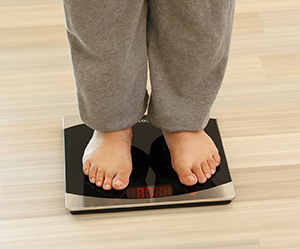Chronic lung disease may include COPD (chronic obstructive pulmonary disease), which is chronic bronchitis and emphysema. It may also include pulmonary fibrosis, and sarcoidosis and other long-term respiratory conditions. Chronic lung disease can affect your weight in 2 ways. Shortness of breath and lack of energy (fatigue) can make it hard to:
-
Take in enough nutrition. This helps to improve your immunity and keeps your body in a healthy state.
-
Do any physical activity. You may not burn as many calories as you take in. This means you may gain weight.
Being underweight can limit your energy. This makes it harder to be active. And it makes you more likely to get an infection. Being overweight can also increase shortness of breath. So you should try to stay at a healthy weight. Weighing yourself regularly helps you do this. If you gain or lose weight without trying to, you may need to make changes in your diet or your treatment plan.
Eating a healthy, balanced diet is important to stay as healthy as possible. So is trying to stay at your ideal weight. Being overweight or underweight can affect your health. Eat a lot of fruits and vegetables every day. And also eat balanced portions of whole grains, lean meats and fish, and low-fat dairy products. Stay away from foods that will cause bloating and gas. They can make it harder to breathe.
Tips for weighing yourself
Follow this advice:
-
Make a habit of weighing yourself at the same time each morning. Do this after using the bathroom and before eating.
-
It’s most accurate to weigh yourself without clothes. If this isn’t possible, wear the same clothes (such as pajamas) each time you weigh yourself.
-
Write your weight on a piece of paper. Keep this near the scale. This will help you see any changes in your weight over time.
-
Call your healthcare provider if you're steadily losing weight over time (without trying to). Or if you gain
3 to 5 pounds in 1 week.
Work with your healthcare provider or a dietitian to set your goal weight. Then weigh yourself as often as directed by your provider or pulmonary rehab team. This may be once a day, once a week, or another time frame.
My goal weight: _____________
How often to weigh: Daily
Weekly
Other: _________________


